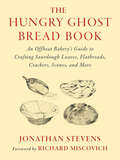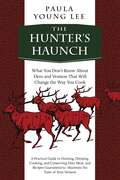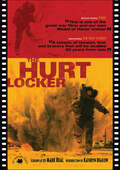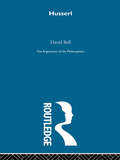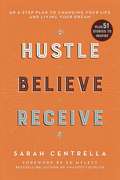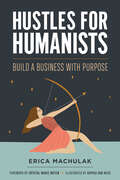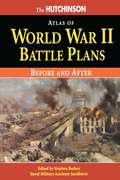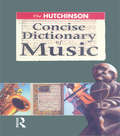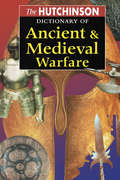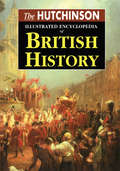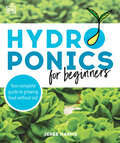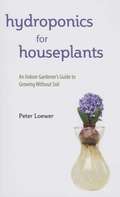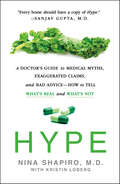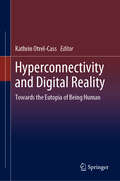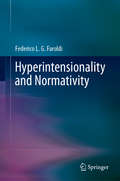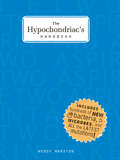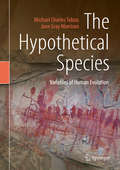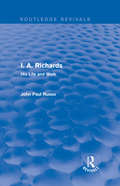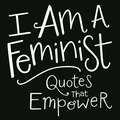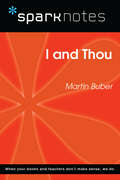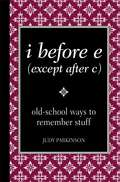- Table View
- List View
The Hungry Ghost Bread Book: An Offbeat Bakerys Guide to Crafting Sourdough Loaves, Flatbreads, Crackers, Scones, and More
by null Jonathan Stevens2024 Foreword INDIES Book of the Year Awards Finalist for CookingLonglisted for the André Simon Award for Food Books for 2024&“A beautifully written book by a true artisan. . . . Easy to read and likely to inspire, this book will take your bread-making to the next level.&”—Sandor Ellix Katz, fermentation revivalist; author of The Art of Fermentation and other fermentation bestsellers&“It&’s impossible to read through the recipes in The Hungry Ghost Bread Book without being inspired to scoop out some sourdough starter and get mixing.&”—Maurizio Leo, author of James Beard Award–winning The Perfect LoafFor the adventurous home baker and small-scale commercial baker alike, The Hungry Ghost Bread Book is a delicious guide and a pious devotional to the wonderful, awe-inspiring world of sourdough.What does it mean to take on the practice of bread? Jonathan Stevens, co-owner of Hungry Ghost Bread in Northampton, Massachusetts, has pondered this question over thirty years of baking sourdough bread. Baking is a ritual that demands attention, physical proximity, close observation, and continual adjustment. It begets sustenance, fosters community, and connects us with a 10,000-year-old craft.The Hungry Ghost Bread Book is a window onto one baker&’s artisan approach to sourdough bread—the culmination of his time in the tide of dough.Sourdough, declares Stevens, is not a style of bread. It is bread. The sourdough starter—the microbial community used to inoculate bread dough—transforms flour into something truly digestible by humans, unlocking the nutrients that are otherwise inaccessible. Stevens&’s unique approach to working with sourdough can be summed up by three tenets, each of which begins with &“more.&” More hydration, more fermentation, and more heat in the oven.Inside these pages, you&’ll find tools, techniques, insights, short-cuts, ingredients, warnings, and a handful of haikus. You&’ll find instructions for creating and nurturing your own sourdough starter, as well as formulas for a variety of loaves, flatbreads, crackers, folds, scones, bagels, and more, including:Eight-Grain BreadFig & Sage BreadPotato-Thyme FougasseSesame-Spelt CrackersRosemary Walnut SconesThe results are quite fantastic: bread that bites back, heels worth chewing on, and scraps worth toasting. A return to real Wonder.&“The Hungry Ghost feeds more than spirits with its spectacular breads.&”—Saveur (naming Hungry Ghost Bread a &“Great American Bread Bakery&”)
The Hungry Student Cookbook: 200+ Quick and Simple Recipes (The Hungry Cookbooks)
by Pauline BacheA student cookbook with a difference, The Hungry Student not only gives more than 200 quick, cheap and tasty recipes that will impress all your mates, but there are also indispensable tips on everything the new student needs to know, from barbecuing tips and drinking games, to how to tackle those tricky household chores. With chapters dedicated to PhD in One Pot, Outdoor Grub, Mates for Tea, Strapped for Cash, Eat Healthy, Bachelor of Budget Bakes & Puds, Back to Basics and The Bar, there are opportunities for impromptu parties, end of the month budget creations and comfort foods for one.Each recipe has a cost breakdown to help with budgeting and detailed instructions to make them accessible to even the most novice cook. While Eat Healthy contains full nutritional information to prep your body and brain for intensive studying (and partying!)Forget the textbooks, this is the only book you'll ever need to get through your first year!
The Hunter's Haunch: What You Don?t Know About Deer and Venison That Will Change the Way You Cook
by Paula Young LeeA new way to look at hunting and deer meat that anyone who owns a venison cookbook must read!Is a doe better eating than a buck? Is hanging really necessary? Why can't venison be aged? Will soaking in milk make that gamy taste go away? The Hunter's Haunch provides straightforward and fascinating answers for these and other questions that every hunter-cook has faced, delving into myths, folklore, hunting history, and modern culinary science in order to explain why certain techniques still work and others don't.Many wild game cookbooks offer recipes for venison chili, venison burgers, venison sausage, and other solutions that make tough and gamy meat edible. By contrast, The Hunter's Haunch aims to rethink the entire process so that rescuing tough meat never becomes necessary in the first place. Focusing on the relationship of the hunt to the rhythms of nature, The Hunter's Haunch examines the deer as a living creature in the wild, showing how the skills of the hunter affect its treatment in the kitchen, and ultimately how the venison tastes when served at the table.Covering the history of deer hunting, practical lessons in game anatomy, and indispensable tips for dressing and prep, The Hunter's Haunch is an essential read for anyone who hopes to transform their quarry into the best possible venison.
The Hurt Locker: The Shooting Script (Shooting Script)
by Mark Boal Kathryn BigelowOne of the most critically acclaimed war films in recent memory, The Hurt Locker is a riveting, extraordinary tale of courage and survival on the Baghdad bomb squad, directed by Kathryn Bigelow, from a script by Mark Boal, who researched the material by traveling to the war in Iraq. Boal's screenplay follows the layered, complex relationship between three soldiers who are thrown together in the crucible of combat—with only 38 days left in their tour. Starring Jeremy Renner, Anthony Mackie, Brian Geraghty, and Evangeline Lilly, with Guy Pearce, Ralph Fiennes, and David Morse.This Newmarket Shooting Script® Book includes: Exclusive Introduction by Kathyrn Bigelow Complete shooting script 16-page color insert with 23 color photos Production Notes Storyboards Complete cast and crew credits
Husserl-Arg Philosophers (Arguments Of The Philosophers Ser.)
by David A BellFirst Published in 1999. Routledge is an imprint of Taylor & Francis, an informa company.
Hustle Believe Receive: An 8-Step Plan to Changing Your Life and Living Your Dream
by Sarah CentrellaIn Hustle Believe Receive, Sarah Centrella, author of the internationally popular blog Thoughts.Stories.Life., proves that anyone, no matter where they start from, can change their life, achieve success, and live their dream. As a single mom living on food stamps, Sarah completely changed her life of poverty to enable her to live her dream in just eighteen months. Sarah discovered the tools to change her life after her husband abandoned her and their three small children in 2008. Her story has impacted hundreds of thousands worldwide through her simple eight-step plan for achieving success known as the #HBRMethod. The book, now in paperback, features fifty-one inspiring stories of people who believe in Sarah’s message, each of whom she personally interviewed for this book. They include: NFL star running back Jonathan Stewart; NBA power forward Anthony Tolliver; famed artist Victor Matthews; best-selling author Laura Munson; middle weight world boxing champion Daniel Jacobs; CEO Ryan Blair; and Morgan Stanley executive director Kimberley Hatchett, among many others. Hustle Believe Receive shows how these stories are connected, and how Sarah, a single mom from Oregon, manages to bring them all together in the most unlikely way.Hustle Believe Receive contains true tales of how real people are living the impossible. This book answers the question of “How did they do that?” and, more importantly, how you can too.
Hustles for Humanists: Build a Business with Purpose
by Erica MachulakAs a humanities professional, your skills are in demand. Despite the challenges of a competitive job market, the unique skill set that you possess is highly transferable to various industries and roles. Knowing how to position your creativity, knowledge and empathy is vital for achieving meaningful employment and professional growth. Hustles for Humanists provides a detailed roadmap for humanities professionals who want to leverage their valuable skills to find or create meaningful work. Drawing from her experiences as an academic turned entrepreneur, Erica Machulak gives practical advice on how to connect with your core values, market yourself, build relationships with clients, and negotiate fair compensation. This is an essential field guide for finding work that aligns with the core values of your humanities scholarship and practice. It demonstrates how the professional strengths of the humanities can be drawn upon to create fairer, more just and equitable entrepreneurial approaches – whether you’re launching a business, job hunting, or looking for inspiration. Hustles for Humanists helps you unlock the value of your humanities practice and explore exciting new pathways to achieving economic stability both within and beyond academia.
The Hutchinson Atlas of World War II Battle Plans: Before And After
by Stephen BadseyThis text contrasts 21 World War II battle plans with their actual outcome. Each in-depth battle essay is complemented by original maps, producing fresh insight into the technical aspects of warfare that drove the last worldwide conflict of the 20th century. An overall introduction gives a strategic overview of the whole of the war, and places the individual battles into context. The battles are presented in seven groups of three, and each group is introduced by a short essay on the common theme for the group.
The Hutchinson Concise Dictionary of Music (Helicon Arts And Music Ser.)
by Barrie JonesThe Hutchinson Concise Dictionary of Music, in 7,500 entries, retains the breadth of coverage, clarity, and accessibility of the highly acclaimed Hutchinson Encyclopedia of Music, from which it is derived. Tracing its lineage to the Everyman Dictionary of Music, now out of print, it boasts a distinguished heritage of the finest musical scholarship. This book provides comprehensive coverage of theoretical and technical music terminology, embracing the many genres and forms of classical music, clearly illustrated with examples. It also provides core information on composers and comprehensive lists of works from the earliest exponents of polyphony to present-day composers.
The Hutchinson Dictionary of Ancient and Medieval Warfare
by HutchinsonFirst Published in 1999. Routledge is an imprint of Taylor & Francis, an informa company.
The Hutchinson Illustrated Encyclopedia of British History
by Simon HallFirst Published in 1999. Routledge is an imprint of Taylor & Francis, an informa company.
Hydroponics for Beginners: Your Complete Guide to Growing Food Without Soil
by Jeree HarmsYou don&’t need the sun or soil to grow food. Wouldn&’t it be great if you could plant and grow food in your house year-round? No more needing to be out in the summer sun. No more needing to find the right soil combination. No more needing to wait until spring or autumn to begin planting. With hydroponics, you can grow food inside your house without having any sun or any soil. Hydroponics for Beginners has all the information you need to set up your own inside garden, including the benefits of hydroponics, the equipment required, and the best system to use. This book also includes these features:Step-by-step techniques for building your hydroponic systemExpert guidance on how to start your seeds and how to light your systemPlanting recommendations for the best kinds of foods to grow hydroponicallyNutrient guides to help your plants burst and thriveTroubleshooting tips to help maintain your hydroponic system Hydroponics for Beginners will explain everything you need to know to not only build a hydroponic system in your home but to also ensure you&’re successful with whatever you grow. Also, if you&’re ever stuck on the Moon or on Mars, if you can find a little water and happen to have some nutrient-rich solutions, you can grow food and survive until someone rescues you. Just make sure you also have a copy of Hydroponics for Beginners with you!
Hydroponics for Houseplants: An Indoor Gardener's Guide to Growing Without Soil
by Peter LoewerPick your container, fill it with water, and sit back and watch your plant grow!This book is the answer to anyone who has ever shied away from growing house plants because of messy dirt or fear of things dying if left for a few days without water. Ditch the hassle and learn how to grow plants indoors with nothing but water.Peter Loewer, an inveterate inventor of water gardening techniques, has written and illustrated this charming guide to teach readers the basics of hydroculture. This technique of growing plants in water has a history of almost 300 years, from experiments by an English botanist to the giant automated factory greenhouses of the twentieth century where vegetables are now grown commercially by the ton. Learn how to utilize this simple, time-tested method in your own home and never worry about over- or under-watering again!Peter Loewer, an inveterate inventor of water gardening techniques, has written and illustrated this charming guide to teach readers the basics of hydroculture. This technique of growing plants in water has a history of almost 300 years, from experiments by an English botanist to the giant automated factory greenhouses of the twentieth century where vegetables are now grown commercially by the ton. Learn how to utilize this simple, time-tested method in your own home and never worry about over- or under-watering again!
Hype: A Doctor's Guide to Medical Myths, Exaggerated Claims, and Bad Advice—How to Tell What's Real and What's Not
by Nina Shapiro Kristin Loberg“[A] top doctor. . . . cuts through the clutter of confusion when it comes to the best advice for your health. . . . Every home should have a copy of Hype.” —Sanjay Gupta, MD, CNN Chief Medical Correspondent and New York Times–bestselling authorThere is a lot of misinformation thrown around these days, especially online. Headlines tell us to do this, not that—all in the name of living longer, better, thinner, younger. Dr. Shapiro wants to distinguish between the falsehoods and the evidence-backed truth. In her work at Harvard and UCLA, with more than twenty years of experience in both clinical and academic medicine, she helps patients make important health decisions every day. She’s bringing those lessons to life here with a blend of personal storytelling and science to discuss her dramatic new definition of “a healthy life.”Hype covers everything from exercise to supplements, alternative medicine to vaccines, and medical testing to media coverage. Shapiro tackles popular misconceptions such as toxic sugar and the importance of drinking eight glasses of water a day. She provides simple solutions anyone can implement, such as drinking 2% milk instead of fat free and using SPF 30 sunscreen instead of SPF 100. This book is as much for single individuals in the prime of their lives as it is for parents with young children and the elderly.Never has there been a greater need for this reassuring, and scientifically backed reality check.“[A] feisty, fact-filled diatribe. [Shapiro’s] skeptical, no-nonsense approach and probing assessment of fact versus fiction make for lively reading that is likely to help readers make better health and medical choices.” —Publishers Weekly
Hyperbole in English
by Claudia ClaridgeNon-literal language is ubiquitous in everyday life, and while hyperbole is a major part of this, it has so far remained relatively unexplored. This volume provides the first investigation of hyperbole in English, drawing on data from genres such as spoken conversation, TV, newspapers, and literary works from Chaucer to Monty Python. Combining quantitative and qualitative analyses, it uses approaches from semantics, pragmatics, discourse analysis and classical rhetoric, to investigate in detail both speaker-centered and emotive aspects of hyperbole, and also addressee-related aspects, such as interpretation and interactional uptake. Illustrated with a range of diachronic case studies, hyperbole is also shown to be a main means of linguistic creativity, and an important contributor to language change. The book concludes with an exploration of the role of hyperbole in political speaking, humour, and literature. Original and in-depth, it will be invaluable to all those working on meaning, discourse, and historical linguistics.
Hyperconnectivity and Digital Reality: Towards the Eutopia of Being Human
by Kathrin Otrel-CassThis book addresses the topic of hyperconnectivity by building on, expanding, and critically examining issues that have to do with information communication technology (ICT) and networked societies. The book explores questions relating to attention and consciousness, techno-capitalism and communicative action taking. Adopting different philosophical angles to assess the challenges we face due to our entanglement with hyperconnected technologies, the book studies performance and performativity in a digitised world by considering the unfolding of our onlife and by looking at what this means to educated future scientists and engineers in a hyperconnected world. The book further discusses digital activities as the new constructs of ourselves and poses questions about how much literacy is needed for us not to be enslaved by those constructs. The book also explores the challenges of hyperconnectivity and the health sector to showcase the vulnerabilities we are increasingly exposed to. It makes clear that - since the boundaries between on- and offline are becoming increasingly blurred - we will require new, flexible frameworks that reconsider what it means to be human in a hyperconnected world.
Hyperintensionality and Normativity
by Federico L. FaroldiPresenting the first comprehensive, in-depth study of hyperintensionality, this book equips readers with the basic tools needed to appreciate some of current and future debates in the philosophy of language, semantics, and metaphysics. After introducing and explaining the major approaches to hyperintensionality found in the literature, the book tackles its systematic connections to normativity and offers some contributions to the current debates.The book offers undergraduate and graduate students an essential introduction to the topic, while also helping professionals in related fields get up to speed on open research-level problems.
The Hypochondriac's Handbook
by Wendy MarstonA humorous guide to understanding all that can affect your well-being, from germs to the healthcare industry.Feeling good? Are you sure? This hilarious guide—a sequel to the bestselling Paranoid’s Pocket Guide—is guaranteed to make you wonder. With hundreds of symptoms to watch for and in-depth information on the latest germ mutations, this compendium offers compelling proof that there is always something to worry about, even if you seem to be in perfect shape. A must-have for today’s health-conscious individual, it also reveals worrisome facts about doctors and insurance companies. It’s packed with black-and-white photos documenting everyday items that can menace your health—often seemingly “harmless” items such as a pencil or a water fountain. Fortunately, this book will make you laugh, which releases endorphins and promotes health—for the moment. For soundness of body and mind, read The Hypochondriac’s Handbook. Better safe than sorry!
The Hypothetical Species: Variables of Human Evolution
by Michael Charles Tobias Jane Gray MorrisonThis book is a provocative and invigorating real-time exploration of the future of human evolution by two of the world’s leading interdisciplinary ecologists – Michael Charles Tobias and Jane Gray Morrison. Steeped in a rich multitude of the sciences and humanities, the book enshrines an elegant narrative that is highly empathetic, personal, scientifically wide-ranging and original. It focuses on the geo-positioning of the human Self and its corresponding species. The book's overarching viewpoints and poignant through-story examine and powerfully challenge concepts associated historically with assertions of human superiority over all other life forms. Ultimately, The Hypothetical Species: Variables of Human Evolution is a deeply considered treatise on the ecological and psychological state of humanity and her options – both within, and outside the rubrics of evolutionary research – for survival. This important work is beautifully presented with nearly 200 diverse illustrations, and is introduced with a foreword by famed paleobiologist, Dr. Melanie DeVore.
I. A. Richards: His Life and Work (Routledge Revivals)
by John Paul RussoA pioneering critic, educator, and poet, I. A. Richards (1893-1979) helped the English-speaking world decide not only what to read but how to read it. Acknowledged "father" of New Criticism, he produced the most systematic body of critical writing in the English language since Coleridge. His method of close reading dominated the English-speaking classroom for half a century. John Paul Russo draws on close personal acquaintance with Richards as well as on unpublished materials, correspondence, and interviews, to write the first biography (originally published in 1989) of one of last century’s most influential and many-sided men of letters.
I Am a Feminist: Quotes That Empower
by Media AdamsWe are the ones we've been waiting for. --June Jordan Empowering, inspiring...evolving. From Susan B. Anthony to Amy Schumer, the feminist movement has grown in number and purpose for hundreds of years--from women's right to vote to wage equality and beyond. Now, 200 leaders of the movement for equal rights and opportunities--female and male; young and old; across politics, the arts, media, and history--share their thoughts on what it means to be a feminist. With quotes that galvanize, hearten, and inform, I Am a Feminist unites the many strong voices that celebrate the past, present, and future of feminism.
I Am a Feminist: Quotes That Empower
by Adams MediaWe are the ones we've been waiting for. --June Jordan Empowering, inspiring...evolving. From Susan B. Anthony to Amy Schumer, the feminist movement has grown in number and purpose for hundreds of years--from women's right to vote to wage equality and beyond. Now, 200 leaders of the movement for equal rights and opportunities--female and male; young and old; across politics, the arts, media, and history--share their thoughts on what it means to be a feminist. With quotes that galvanize, hearten, and inform, I Am a Feminist unites the many strong voices that celebrate the past, present, and future of feminism.
I Am Bride: How to Take the WE Out of Wedding (and Other Useful Advice)
by Laura Willcox“One of the best books for brides . . . Her satirical, tongue-in-cheek take on making your wedding all about yourself will offer some much-needed laughs.” —Real SimpleIn this bridal gag gift, Upright Citizens Brigade comedian Laura Willcox writes in the voice of an overbearing, outrageous wedding planner, covering all aspects of a wedding—from the moment of engagement (hopefully with the ring you’ve been not so subtly emailing him about for months), all the way through the final minutes of the big day. Accompanied by Jason O’Malley’s humorous illustrations, Willcox offers tongue-in-cheek advice for every wedding-planning moment, whether it’s dreaming up the perfect wedding-weekend hashtag, planning a gift registry to make everyone jealous of your fabulous lifestyle, or figuring out how to distance yourself from the poor, unfortunate souls who didn’t make the cut for your guest list. Laura Willcox’s refreshing take on all things bride will turn tradition on its head, and have you rolling your eyes and reading passages out loud to your engaged (and married) friends. This funny book is a perfect gift for the friend who can’t stop pinning to her dream wedding board, bridezilla-to-be, or any bride who would benefit from a much-needed break from the stress and madness of wedding planning.“Perfectly mocks the absurd wedding-planning industry. Whether you’re having a big wedding to prove something to your ex, or a small wedding to make your loved ones feel excluded, this book will make you laugh through the overwhelming planning process.” —Lauren Lapkus, actor and comedian
I and Thou (SparkNotes Philosophy Guide)
by SparkNotesI and Thou (SparkNotes Philosophy Guide) Making the reading experience fun! SparkNotes Philosophy Guides are one-stop guides to the great works of philosophy–masterpieces that stand at the foundations of Western thought. Inside each Philosophy Guide you&’ll find insightful overviews of great philosophical works of the Western world.
i before e (except after c)
by Parkinson JudyHere is an amusing collection of ingenious mnemonics devised to help us learn and understand hundreds of important fact as children and can continue to resonate with us as adults. Featuring all the mnemonics you?ll ever need to know, this fun little book will bring back all the simple, easy-to-remember rhymes from your childhood?once learned, fix the information in the brain forever?such as learning to count by reciting ?One, Two, buckle my shoe, Three, Four, knock at the door.? Packed with clever verses, engaging acronyms, curious?and sometimes hilarious?sayings that can be used to solve a problem or cap an argument. Take a trip back to the classroom, and rediscover the assortment of practical memory aids covering a range of different subjects, including spelling, time, mathematics, history, general trivia, and much more. The information is organized in short snippets by category such as: * Geographically Speaking: Remember North East South West by reciting Never Eat Slimy Worms or Naughty Elephants Squirt Water. * Time and the Calendar: ?Thirty days hath September, April, June, and November; All the rest have 31 excepting February alone; And that has 28 days clear; With 29 in each leap year? * Think of a Number: Know the Roman numerals by remembering ?I Value Xylophones Like Cows Dig Milk? * World History: ?In fourteen hundred, ninety-two, Columbus sailed the ocean blue, And found this land, land of the Free, beloved by you, beloved by me? The clever verses, engaging acronyms, curious sayings are endless. Guaranteed to amuse and inform, here is a perfect gift for any language lover?complete with a To/From gift plate.
